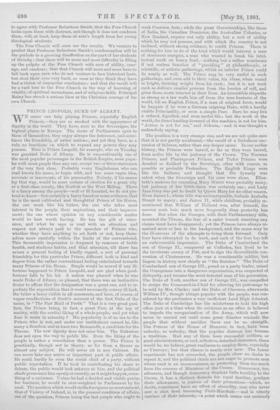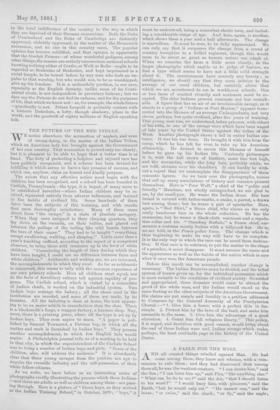PRINCE LEOPOLD, DUKE OF ALBANY.
WE never can help pitying Princes, especially English Princes,—they are so mocked with the appearance of dignity in the world. They have, next to the Sovereigns, the highest places in Europe. The doors of Parliaments open to them of themselves, they enjoy always the deference, and some- times the friendship, of entire nations ; and yet they have, as a rule, no functions on which to expend any powers they may possess. Here is Prince Leopold, for example, who on Tuesday was gazette(' Duke of Albany. He is unquestionably one of the most popular personages in the British Empire, more popu- lar with more people than any one, except two or three statesmen of the very first class. Probably every Englishman who can read knows his name, to begin with, ,and has some vague idea, accurate or inaccurate, of his personality. Nobody, if his career lay that way, would be more certain of election for a great city or a first-class county, like Norfolk or the West Riding. There is a fancy among the people—well or ill founded, we do not pre- tend to know—but certainly a fancy based on some evidence, that he is the most cultivated and thoughtful. Prince of his House, the one most like his father, the one who takes most interest in the people, their aspirations, and their improve- ment; the one whose opinion on any considerable matter would be best worth having. He has the gift of utter- ance, and what he says is read with an attention and respect not always paid to the speeches of Princes who, whether they have anything to set forth or not, keep them- selves more carefully within the limits of the conventional. This favourable impression is deepened by rumours of feeble health, and studious habits, and filial attention, till there has arisen a general feeling of kindly regard, a sort of personal friendship for this particular Prince, different both in kind and degree from the rather conventional feeling entertained towards many Princes of his House. People would be moved if any ill- fortune happened to Prince Leopold, and are glad when good- fortune falls to his lot. A nation was pleased when he was made Duke of Albany, so pleased, that there was an instinctive desire to affirm that the designation was a great one, and to re- pudiate the superstition that it would necessarily convey ill-luck, the latter a fancy visible in all comments, and born, of course, of vague recollections of Scott's account of the first Duke of the name, in " The Fair Maid of Perth." That is a very great posi- tion, the Prince being, in fact, a great Peer, at the top of society, with the cordial liking of a whole people;- and yet what does it mean in actuality P His popularity is of no use to the Prince, who is not, and under our institutions cannot be, like many a Bourbon and at least two Rom anoffe, a candidate for the Throne. The new dignity does not raise him. The Dukedom does not open the way to public life. Even the liking of the people is rather a consolation than a power, The Prince is practically, though not in theory, as far fioni a throne as almost any subject; He will never sit in any Cabinet. He can never take any active or important part in public affairs. He could hardly be even the social chief of a party, without public reprobation. If he took to contributing his share to debate, the public would look askance at him, and the political chiefs pronounce him openly or secretly, as it might happen, some- thing of a nuisance. Unless be had a decided and visible genius for business, he would be over-weighted in Parliament by his rank. The position which would strike foreigners as most natural, that of Viceroy of Ireland, is, in the present condition of affairs, out of the question, Princes being the last people who ought to work Coercion Acts ; while the great Governorships, like those of India, the Canadian Dominion, the Australian Colonies, or New Zealand, require not only ability, but a sort of ability which he may not possess, and with which the country is not inclined, without strong evidence, to credit Princes. There is nothing for him to do of the kind which would interest a man of strenuous energies, a man who wanted to break his intel- lectual teeth on heavy food,—nothing but a rather wearisome if not useless function of " presiding " at philanthropic, or scientific, or artistic gatherings, which an inferior Prince could do nearly as well. The Prince may be very useful in such gatherings, and even add to their value, his ideas, when sound or bright, deriving weight from his rank ; but it is not work such as delivers smaller persons from the burden of self, and gives them acute interest in their lives. An irresistible etiquette as strong as a law walls him off from the true business of the world, till an English Prince, if a man of original force, would be happier if he were a German reigning Duke, with a hardly visible Principality, or even a simple Peer. Here he may live a refined, dignified, and oven useful life ; but the work of the world, the direct hauling-forward of the machine, is not for him. "Action is not for me," said Sidonia,—and it was thought a melancholy saying.
The position is a very strange one, and we are not quite sure that it is not partly accidental,—the result of a fortuitous suc- cession of failures, rather than any deeper cause. In our earlier history, the Princes wore barred, so far as they were barred, from active life by the jealousy of the Crown. The Norman Princes, and Plantagenet Princes, and Tudor Princes were dreaded or disliked by the Sovereign, often with reason, as possible or probable Pretenders. The English Kings were like the Sultans, and thought that the dynasty was safest when the Sovereign and his sons were alone. Eliza- beth's motives for executing Mary Stuart were probably many, but jealousy of her birth-claim was certainly one; and Lady Jane Grey was put to death by Queen Mary for no other reason. Even James I., whose title was unimpreguable, forbade Arabella Stuart to marry ; and James II., while childless, probably re- membered that William of Holland was, after himself, the nearest male heir; much more frequently than posterity has done. But when the Georges, with their Parliamentary title, mounted the Throne, the fear of a cadet branch asserting any claims must have disappeared; yet the Princes have always re- mained more or less in the background, and the cause may be the ill-success of the attempts to bring them forward. Only four have attempted to do work, and each of the four has left an unfavourable impression. The Duke of Cumberland the son of George II., conquered. at Culloden, but lived to be the inveterate enemy of Pitt, and to sign the discreditable con- vention of Closterseven. He was a considerable soldier, but lingers in history now chiefly as " the Butcher." The Duke of Cumberland. son of George III., posed as a party leader, raised the Orangemen into a dangerous organisation, was suspected of disloyalty, and became the most detested man of his generation. The Duke of York, another son of George III., was compelled to resign the Command-in-Chief for allowing his patronage to be sold by Mrs. Clarke ; and the Duke of Clarence, afterwards William IV., though always popular with the people, was con- sidered by the profession a very inefficient Lord High Admiral. The Duke of Cambridge has the misfortune to hold his high office just at'a time when its existence as an office is believed to impede the reorganisation of the Army, which will now never be carried out until some great disaster reminds the people that without sacrifice there can be no strength. The Princes of the House of Hanover, iu fact, have been unlucky, so unlucky, that the popular distrust has become a tradition. Had any of them been successful soldiers, or good administrators, or cool, reflective, detached. statesmen, there would be, we believe, great readiness to employ them, especially as Viceroys ; but that chance is nearly over now. The Lorne experiment has not succeeded, the people show no desire to repeat it, and the political chiefs aren)rootecatmeig. tothie)mromt000temmu men whose rank is an inconvenience, as protecting from the censure of Ministers of the Crown. Democracy, too, advances, and though democracy displays little hostility to the Crown, it has a distinct distaste for royal families, grudges their allowances, is jealous of their promotions—which, no doubt, sometimes have an effect of absurdity, men who never saw a shot fired becoming Field-Marshals — and is utterly careless of their interests,—a point which comes out curiously
in the total indifference of the country to the way in which they are deprived of their German successions. Both the Duke of Cumberland and the Duke of Cambridge are distinctly oppressed, violently oppressed, in the matter of the Brunswick succession, and no one in this country cares. The popular opinion has become solidified, and that opinion is apparently that the Guelph Princes—of whose wonderful pedigree, among other things, the masses are entirely unconscious, national schools knowing nothing either of Cerdic, or Welf, or Rollo—ought to be regarded as Brahmins of Brahmins, and kept imprisoned in social temple, to be bowed before by any man who feels an im- pulse to that worship, but who would not, to be so worshipped, give up his freedom. It is a melancholy position, in our eyes, especially as the English dynasty, unlike most of its Conti- nental rivals, is not independent in pecuniary fortune ; but we dare say the Princes do not feel its sadness, and for the purposes of life, that which we know not—as, for example, the whole future —practically is not. Prince Leopold is probably content with a historic Dukedom, a lofty, though shadowy, place in the world, and the goodwill of eighty millions of English-speaking folk.



































 Previous page
Previous page